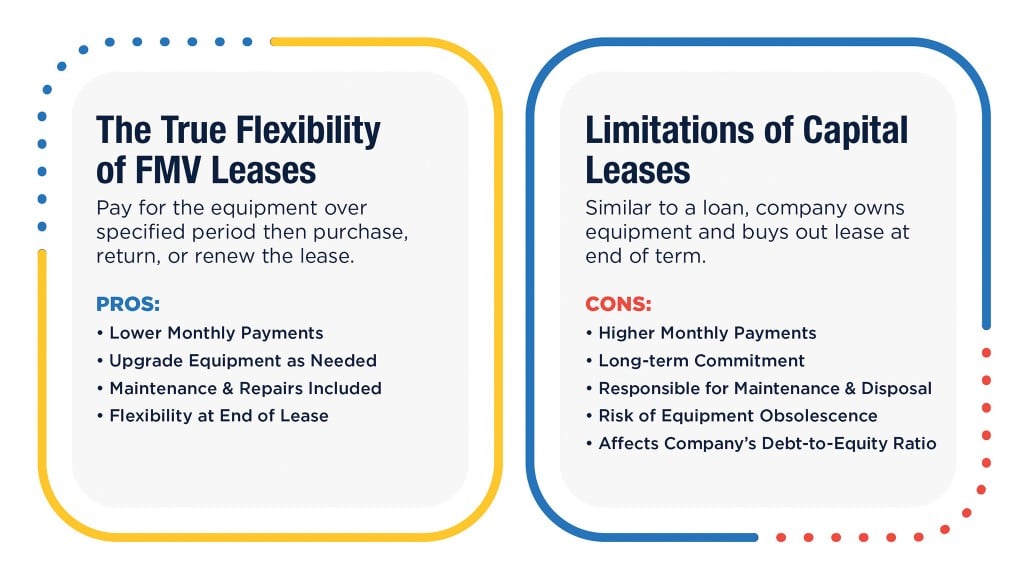Which lease type is more flexible? Debunking myths & misconceptions
Understanding the true nature of Fair Market Value (FMV) and Capital Leasing agreements can help companies make more informed decisions aligned with their operational needs and strategic goals

Construction companies often need to make decisions about how to finance their heavy equipment. There are two main options: operating leases, also known as FairMarket Value (FMV) leases, and capital leases, also known as finance leases. Although both leasing options have their advantages, there's a common misconception that capital leases offer greater flexibility. However, a closer look shows that FMV leases may actually be a better choice to provide the quintessential operational versatility that construction companies need.
Let's take a closer look at each leasing type to debunk the myth of capital lease flexibility and highlight how and why FMV leases can provide optimal flexibility, making this lease type a far superior choice.
Understanding capital leases
Capital leases essentially give the lessee (borrower) ownership of the equipment. The lease term typically covers most of the equipment's useful life. At the end of the lease term, the lessee has the option to purchase the equipment for a nominal fee, usually $10 or $1. This type of lease is recorded as an asset and a liability on the company's balance sheet, reflecting the equipment's value and the obligation to make future lease payments.
Advantages of capital leases
1. Ownership benefits: The lessee eventually owns the equipment, which can be advantageous if the machinery has a long operational life and is essential to the company's core activities.
2. Depreciation: Although I'm not an accountant, nor do I play on TV, the company can benefit from tax advantages related to the equipment's depreciation.
3. No usage restriction: There is no limitation on how many hours a construction company can operate the machinery throughout the lease term. Since the equipment cannot be returned, there are also no concerns about its condition at the end of the lease term. This is beneficial if the equipment is heavily used and may not be in a suitable condition for return.
At first blush, capital leases may seem to offer quite a bit in the way of flexibility, but there's more to this story. Despite these advantages, capital leases may not be as flexible as they appear.
The illusion of flexibility in capital leases
The perception of flexibility with capital leases often comes from the aspect of ownership. However, this ownership can limit flexibility in several ways:
1. Long-term commitment: Capital leases require a long-term commitment to the equipment. This can be a significant drawback if a company's needs change or technological advancements render the leased equipment obsolete. In an industry where machinery and technology evolve rapidly, being tied to older equipment can be a disadvantage.
2. Balance sheet impact: Since capital leases are recorded as assets and liabilities, they increase a company's debt-to-equity ratio — a key financial statement metric. This can affect the company's financial health, potentially making it more challenging to secure additional financing or impacting borrowing costs, which can restrain growth.
3. Maintenance and disposal: Ownership means the lessee is responsible for all maintenance and disposal costs. These costs can be substantial for heavily used construction equipment. Additionally, the company must manage the logistics of selling or disposing of the equipment at the end of its useful life, adding another layer of complexity. This often means the company must employ its own team of technicians.
The true flexibility of FMV leases
Alternatively, FMV leases offer a different kind of flexibility that can be aligned with the dynamic needs of construction companies. Under an FMV lease, the lessee pays for the use of the equipment for a specified period, with the option to purchase the equipment at its fair market value at the end of the lease term. Alternatively, the lessee can choose to return the equipment or renew the lease, and in some cases, this can be on a month-to-month basis.
Advantages of FMV leases
1. Lower monthly payments: FMV leases typically have lower monthly payments compared to capital leases. This is because the lessee is not paying for the full cost of the equipment, just for its use during the lease term. Lower payments improve cash flow, allowing the company to allocate financial resources to other critical areas.
2. Upgrade options: At the end of the lease term, companies can return the equipment and lease newer models. This is particularly beneficial in the construction industry, where technology and equipment quickly become outdated. The ability to upgrade ensures the company always has access to the latest and most efficient machinery.
3. Maintenance and repairs: Many FMV leases include maintenance and repair services. This reduces downtime and transfers the burden of maintenance costs away from the company while helping ensure the equipment remains in optimal condition throughout the lease term.
4. Flexibility at lease end: FMV leases provide multiple options at the end of the lease term. The lessee can return the equipment, purchase it at fair market value, or extend the lease. This flexibility allows construction companies to adjust their equipment needs based on business conditions and project requirements.
Debunking the myth
Many people mistakenly believe that capital leases offer more flexibility due to the traditional association of ownership with control. However, in the fast-paced construction industry where adaptability and financial agility are crucial, Fair Market Value (FMV) leases often provide superior flexibility. They enable companies to keep up with technological advancements, manage cash flow more effectively, and avoid the pitfalls associated with long-term ownership commitments.
While capital leases have their own benefits, they do not necessarily provide greater flexibility. For numerous construction companies, FMV leases present a more versatile and financially prudent option. Understanding the true nature of these leasing agreements can help companies make more informed decisions aligned with their operational needs and strategic goals. The real flexibility lies in the ability to adapt to changing circumstances — something that FMV leases facilitate far better than capital leases.
Nelson Abelha is the regional vice president of First Financial Canadian Leasing,
Company info
501-77 City Centre Drive East Tower
Mississauga,, ON
CA, L5B 1M5



